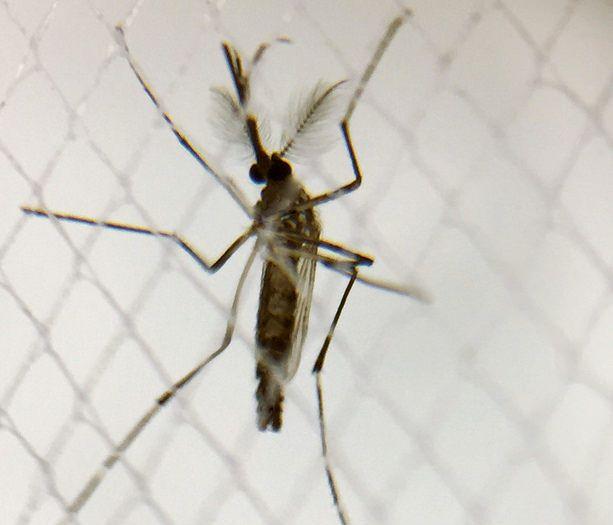In Zika-related mosquito developments, Brazilian researchers announced yesterday the first virus detection in wild-caught Aedes aegypti mosquitoes, and regulatory officials in the United States are reviewing a company's application to market Wolbachia bacteria as a pesticide.
Meanwhile, the Pan American Health Organization (PAHO) posted a new document offering guidance from experts on ethical issues surrounding the outbreak, and health officials in Colombia and Costa Rica reported on microcephaly cases.
Infected urban mosquitoes
In a statement in Portuguese on its Web site, the Fiocruz Institute said over the past 10 months researchers have been collecting mosquitoes in locations where Zika infections have been identified in Rio de Janeiro state.
Of 1,500 collected for analysis, nearly half were Aedes aegypti. Reverse-transcriptase polymerase chain reaction testing and virus isolation identified Zika virus in mosquitoes from Sao Joao de Meriti and Realengo. Sao Joao de Meriti, known as "Americas' anthill" because of its extremely high population density, lies 20 miles northwest of Rio de Janeiro, and Realengo is about the same distance west of the main part of Rio.
No other mosquito species were found to be infected with the virus, and the Fiocruz Institute said the finding reinforces the role of A aegypti in the spread of Zika virus. It added that researchers are in the process of publishing the data.
Until now, the only positive Zika findings in wild-caught mosquitoes were in Aedes albopictus from Mexico. In early April, tests confirmed the virus in mosquitoes caught during surveillance in San Luis Potosi state, located in central Mexico.
In a Science news report yesterday, Oliver Brady, DPhil, an epidemiologist at the University of Oxford, said it's extremely difficult to find the virus in a mosquito, because they infect people and die before people present for care for disease symptoms.
EPA weighs Wolbachia application
Meanwhile, the US Environmental Protection Agency (EPA) is reviewing an application from the biotechnology company MosquitoMate to use Wolbachia bacteria to fight A albopictus mosquitoes, according to a news report today from Nature.
The EPA's decision is expected after the public comment period ends on May 31. If it approves the application, the United States would be the first country to approve commercial use of Wolbachia against mosquitoes.
When a World Health Organization (WHO) expert group met in March to discuss if any new methods would be useful in battling mosquitoes to curb the spread of Zika virus, Wolbachia was one of only two methods that the group recommended for careful pilot testing.
Earlier this month, Fiocruz Institute researchers reported for the first time that Wolbachia bacteria can dramatically curb the ability of A aegypti to transmit Zika virus.
According to the Nature report, MosquitoMate's strategy is to release infected males to mate with uninfected females. Eggs fertilized by infected males don't hatch, which helps reduce mosquito populations. In tests in three US states over the past 3 years, the mosquitoes reduced wild A albopictus populations by about 70%.
The company recently launched a field test at a California location targeting A aegypti mosquitoes and has applied to do similar tests at sites in Florida and at another in California, Nature said.
The idea of using Wolbachia bacteria seems to be meeting much less public resistance than a proposal by Oxitec to test genetically modified male mosquitoes in a Florida field trial, according to the report. The story noted that the public input portal for the EPA's Wolbachia review only had one comment, whereas the Food and Drug Administration has more than 2,600 for its consideration of Oxitec's proposed field trial.
Ethics guidance, microcephaly findings
- PAHO recently published ethics guidance on key Zika outbreak issues, based on a 23-member expert consultation meeting held Apr 6 and 7 at its headquarters in Washington, D.C. One of the main recommendations was that women should be given the capacity to choose among all relevant reproductive options, including contraception, abortion, and carrying to term a potentially affected fetus. The group also outlined ethical duties in healthcare delivery, public health activity, and research.
- Costa Rican health officials said a woman from El Salvador who had a suspected Zika infection delivered a baby girl with microcephaly in Costa Rica in April, Reuters reported yesterday. It said if the case is confirmed, it would be the sixth Zika-linked microcephaly case in Central America and the first to be recorded in Costa Rica.
- Colombia's health ministry confirmed three more Zika-related microcephaly cases, raising its total to five, according to a May 21 Associated Press report. The agency added that 4,097 Zika infections have been confirmed in pregnant Colombian women.
See also:
May 23 Fiocruz Institute statement
May 23 Science report
May 5 CIDRAP News story "Bacteria shown to curb mosquitoes' ability to spread Zika"
May 24 Nature News report




















